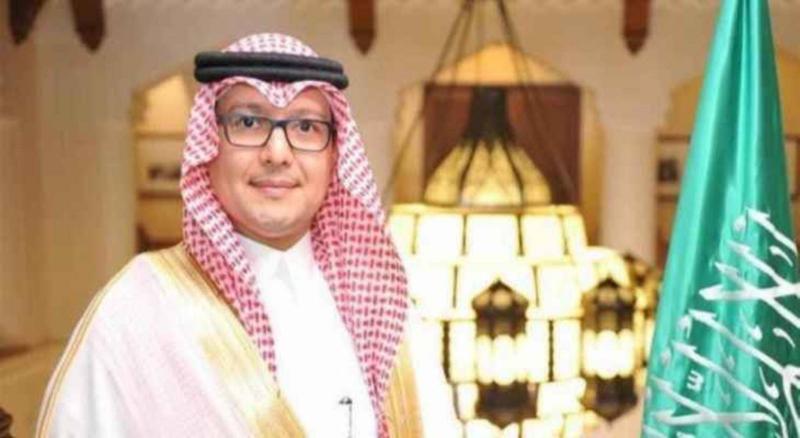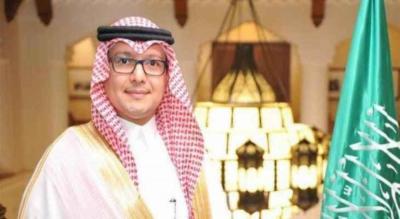The movement of Saudi Ambassador Walid Bukhari, upon his return from holiday in Saudi Arabia to Beirut, has drawn significant attention after reports indicated that there would be activities in Lebanon to revive the presidential file despite the ongoing Gaza war and events in the south. It was mentioned that U.S. envoy Amos Hochstein's role would not be limited to land demarcation or implementing UN resolution 1701, but would extend to the presidential election, as he indicated to some people he met during his recent visit to Beirut.
In this context, according to "An-Nahar," Bukhari's rounds included meetings with spiritual and political references, and there is a prevailing atmosphere that his agenda is packed with appointments, with a single message: "The Kingdom will not abandon Lebanon." The Kingdom is expected to play a prominent role within the quintet committee, with ongoing coordination taking place discreetly between Riyadh, Paris, and other committee countries, as previous divergences have been resolved. Additionally, there is an anticipated meeting among ambassadors of the committee in the Lebanese capital that may be held at the Saudi ambassador's residence in Yarzeh.
Furthermore, there are indications that French envoy Jean-Yves Le Drian will return to Beirut, as will the Qatari envoy, suggesting that the presidential file is being pursued at the highest levels. Although the current tumultuous atmosphere in Lebanon, particularly the flare-up in the southern front and remarks made by Hezbollah Secretary-General Hassan Nasrallah, reflect ongoing tensions linked to the situation in Gaza, efforts are being made to distinguish the presidential issue from the war for various reasons.
In this regard, political sources following this path confirm that Ambassador Bukhari did not discuss specific presidential names during his meetings but spoke in general terms, meaning that Saudi Arabia has never abandoned Lebanon, "but you must help yourselves and elect a president." Bukhari reiterated that the president must be a Maronite, a national Arab figure, and that the Kingdom has not engaged in narrow political maneuvers or name games but has outlined approaches and specifications that now constitute a protective framework for the quintet committee. There is complete consensus without disclosing any specific names, although there is no secrecy that Army Commander Joseph Aoun is at the forefront. Nonetheless, it is evident that the president must be elected within the framework of international and regional consensus alongside Lebanese agreement, and the historical international dynamics are such that the last quarter hour is crucial, with surprises being a possibility.
It is no secret, according to informed sources, that the Vatican is operating discreetly and communication has taken place between senior Vatican officials and French officials to expedite the election of a president, given that the Vatican is concerned about Lebanon and the Christian presence during this phase, where war devastates the region, and conditions are poised to worsen. The presidential vacuum undermines the Christian role in Lebanon, with some Christian parties bearing responsibility for the current situation due to disagreements and divisions that have contributed to the prolongation of the vacuum and the failure to elect a president.
The sources add to "An-Nahar" that the Saudi initiative, the quintet committee, Le Drian's return, and Hochstein's efforts do not imply that a president will be elected tomorrow or next month; the matters are still under observation. However, there are indications of considerable pressure from members of the quintet committee and consensus on resolving this dilemma. Future communications and meetings are expected to differ significantly from past phases, meaning that someone will bear responsibility for any obstruction. The question remains: Will a president be elected? The sources respond that the prevailing atmosphere indicates that the situation may be heading toward what could be termed the "last cartridge." Until now, communications and meetings among quintet members have been characterized by consensus rather than divergences, with hints that the Qataris are in communication with the Iranians to secure comprehensive coverage for facilitating the election of a president. The role of Doha does not come in isolation from Riyadh, nor does the same apply to the entire quintet committee, indicating seriousness and determination to achieve the desired results—something that will become evident in the coming days, as there are strict trends to prepare for potential outcomes concerning Lebanon.
It remains that the presidential election and other internal and constitutional files cannot be definitively concluded as long as the war rages on the southern borders, especially after Nasrallah affirmed that as long as the war in Gaza continues, the same holds true in the south. Thus, all considerations are taken into account, but surprises are possible due to the sensitivity and seriousness of the internal situation.




